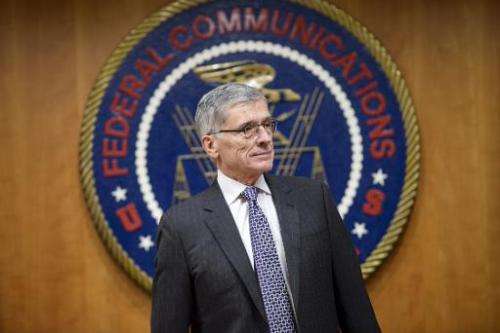US proposal seeks to head off Internet 'fast lanes' (Update)

The top US telecom regulator proposed Wednesday to regulate broadband Internet service providers as "public utility" carriers, in a renewed effort to enforce "net neutrality" rules.
Federal Communications Commission chairman Tom Wheeler unveiled the plan which aims to prevent Internet providers from playing favorites or blocking some services or allowing others to pay for "fast lanes."
The new proposal comes a year after a federal court struck down the FCC neutrality rules, saying it lacked the authority because Internet providers were not "common carriers" under US telecom law.
The plan, which is expected to unleash a fresh legal and political battle, aims to resolve the impasse by reclassifying Internet service providers as regulated entities under the 1934 Telecommunications Act.
"The Internet must be fast, fair and open," Wheeler said in an essay in Wired magazine.
"That is the message I've heard from consumers and innovators across this nation. That is the principle that has enabled the Internet to become an unprecedented platform for innovation and human expression."
Wheeler said his plan, to be submitted to the five-member commission for a vote later this month, would call for "the strongest open Internet protections ever proposed by the FCC."
He would ban "paid prioritization," which would allow services to pay for faster connections, as well as "blocking and throttling of lawful content and services."
The move comes after President Barack Obama voiced support in November for a similar plan, arguing online services that don't pay extra fees should not be in a "slow lane."
Mobile Internet, too
The Wheeler plan would reach deeper into the Internet, beyond consumer-facing offerings to "interconnection" services and allow the FCC to investigate alleged discriminatory practices at that level.
Wheeler said he would apply the rules to the mobile Internet for the first time as well.
Critics of the approach argue that the 1930s-style regulation would choke off investment in the Internet and stifle innovation.
A senior FCC official said however the move represents a "light touch" effort which uses only some segments of the 1934 law without imposing fees or other types regulation.
Wheeler pledged "no rate regulation" or tariffs and said his plans "can encourage investment and competition."
The "neutrality" rules aim to ensure that all services have equal access to the Internet, so that a provider such as Verizon or AT&T could not block a service such as Netflix and favor a rival like Hulu.
Reaction on both sides
Reaction was swift to the plan, which had generated speculation for days.
Doug Brake at the Information Technology and Innovation Foundation, a conservative think tank, said the plan was "an unjustified, overblown response to what has in actuality been a by-and-large hypothetical concern" and warned it may "Balkanize the Internet into distinct private networks and specialized services."
But the digital rights group Access welcomed the move as a win for consumers.
"The FCC's move will be felt far beyond US borders," said Access policy counsel Peter Micek.
"Advocates around the world—from Argentina to Turkey to South Korea to the European Union—are fighting for many of the same protections as those being proposed by Wheeler."
The Internet Association, which includes Google, Facebook and Netflix, also lauded the plan.
"There is only one Internet, and users expect that they be able to access an uncensored Internet regardless of how they connect," association president Michael Beckerman said.
The new initiative comes after the January 2014 ruling by a federal appeals court which struck down the FCC's 2010 rules on net neutrality.
But even if the new proposal is adopted, a fresh legal challenge is likely.
Verizon, which filed the earlier legal challenge, quickly criticized the new Wheeler plan.
"Heavily regulating the Internet for the first time is unnecessary and counterproductive," said Verizon vice president Michael Glover.
Republican lawmakers criticized the move, saying Congress is prepared to pass its own guidelines.
Representative Greg Walden denounced the move as a "heavy-handed regulatory takeover of the Internet."
Bob Goodlatte, who heads the House Judiciary Committee, said Wheeler "overestimates the FCC's authority to rewrite our nation's communications laws—a responsibility tasked to Congress... and ignores the fact that his net neutrality rules almost certainly will be stuck in courts for years."
© 2015 AFP


















